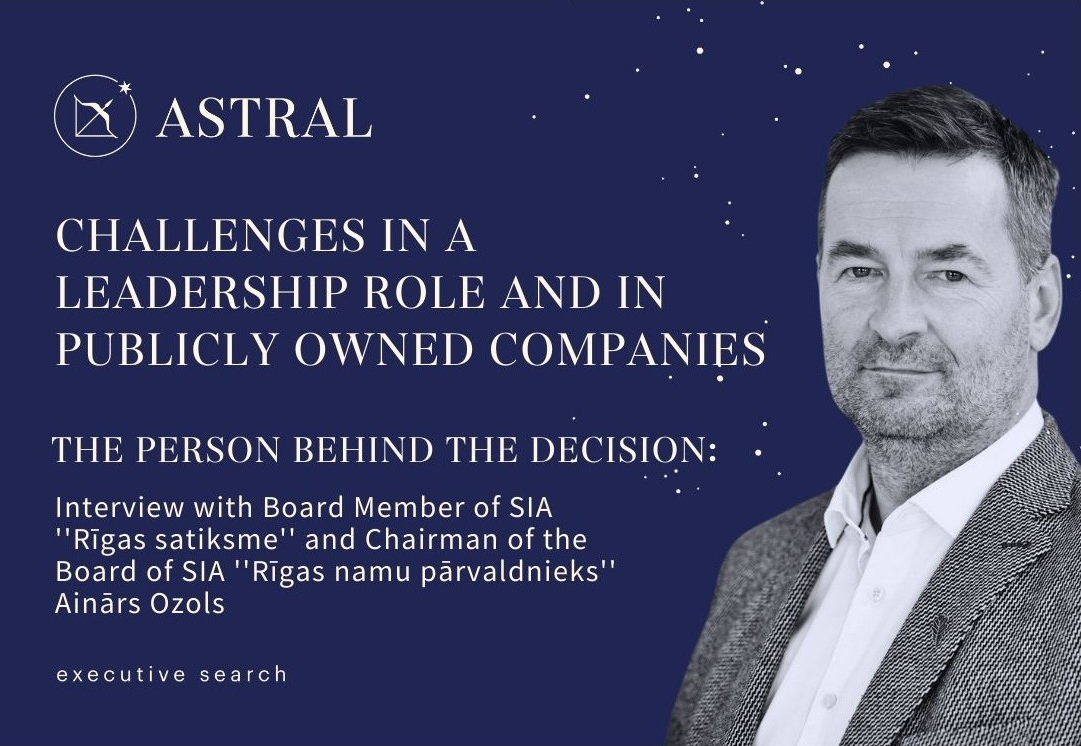Iluta Gaile, a board member of ASTRAL Executive Search, met with Ainārs Ozols, board member of SIA ”Rīgas satiksme” and chairman of the board of SIA ”Rīgas namu pārvaldnieks”, to learn about the challenges of a leadership role in publicly owned companies, both in addressing political and societal challenges and in driving organizational change.
How would you describe yourself?
I am a leader with more than 30 years of experience, having started my management career in 1993. I have worked in the financial sector for about 25 years, and during the past seven years I have deliberately divided my time between several projects simultaneously. It’s not easy, but I enjoy the dynamism, diversity, and the opportunity to see situations in a broader context.
I have always been drawn to reviewing “the big picture” — the ability to understand direction, assess priorities, and lead a team strategically. When it’s necessary to dive into finer details, I rely on professionals who do that work with great quality, while I stay focused on the overall structure and the final outcome.
Please tell me more about these roles and the organizations you are involved in!
I am involved in several projects, each of which appeals to me with its purpose and development potential. For example, I serve as a board member at an investment brokerage company. I am also involved in a financial technology company where we are currently building a holding structure.
A particularly meaningful project for me is the personal development program for change leaders — Dziļumspēks — which we launched last year together with like-minded colleagues. Its goal is to develop new leaders within Latvian society. The first season has already concluded, and I participated both as the program’s creator and as a lecturer. It is a project I am truly proud of.
At the Baltic Institute of Corporate Governance, I am one of the first graduates, and I now teach corporate strategy there. It is an opportunity to share my experience and perspective with both private- and public-sector board and council members.
I am also one of the founders of the Maternity Hospital Foundation — an initiative that remains close to my values and my conviction about its importance to society.
If you had to describe yourself in three words, what would they be?
In three words — an experienced leader with a high tolerance for diversity and the ability to successfully bring together different personalities and guide them toward a common goal.
What motivated you to become a leader? Was there a story from your childhood or an influence from your parents?
Honestly, there wasn’t a specific story or a childhood dream about becoming a leader. In the early 1990s everything was changing rapidly — young people could build careers quickly, gain influence, and also earn well. I had strong career ambitions, and I simply took advantage of the opportunities that opened up at that time.
I think that, subconsciously, there was also a desire to lead people and unite them around a common goal, but it wasn’t a deliberate choice — it was more of a natural step in that dynamic period.
Did you already have leadership qualities in childhood, or did they develop later?
As a child, I didn’t feel like a leader. It seemed more like others were smarter and more confident than I was. The awareness of leadership came later — especially when I participated in a leadership development program in Sweden. There, the instructor noticed that I was intuitively taking on an informal leadership role within the group. That was the moment when I first consciously saw how leadership works and what it truly means to lead people.
How would you define a good leader today? Has this definition changed over the past ten years?
In my view, a good leader today is no longer just a hierarchical “business person” who focuses solely on strategy and results. In a leadership role today, the ability to listen, understand the team’s feelings, and manage emotional processes is extremely important.
This definition has definitely changed over the past ten years. Leaders who genuinely listen to their teams and respect people’s needs are far more successful today. A good leader must be able to combine strategic thinking with empathy — only then can they create an environment where people are motivated and deliver their best results.
What was your first experience and initial impressions when you started working on the board of a municipally owned company? What surprised you the most?
Somehow, I always seem to end up in places that others tend to avoid. That was exactly the case with the municipal companies in Riga in 2019 and 2020. At first, it felt like everything was very complicated and slow. For example, at that time “Rīgas satiksme” faced serious corruption issues, which created a great deal of distrust and made any changes difficult. At the same time, it was clear that many people didn’t want to take responsibility and were afraid of making mistakes. The company’s reputation was terrible, and initially there was little hope that changes would happen quickly. What surprised me the most was how deeply fear of responsibility can take root and how heavy the burden of reputation can be.
What was the biggest difference when you transitioned from an operational manager to a board member?
The transition from an operational manager to a board member was a very significant change for me. In a board, the main role is to ask the right questions and guide thinking, rather than provide all the answers yourself. After 25 years in operational management, I had to get used to the fact that my task was to support the company strategically, not to get involved in day-to-day processes.
This is especially noticeable in municipal companies, where hierarchical culture is strong — often, what a board member says is perceived as absolute truth. This can be risky because people may start relying too much on the board’s opinion and avoid making independent decisions. This dynamic was one of the most important differences I had to recognize and learn to navigate.
Has your experience on the board of ''Rīgas satiksme'' made it easier to serve on the board of ''Rīgas namu pārvaldnieks''?
Yes, my experience on the board of “Rīgas satiksme” definitely helped, but the board of “Rīgas namu pārvaldnieks” also had its own specific challenges. In the public sector overall, there is more bureaucracy, and almost any decision can trigger resistance or wider discussion. Unlike in the private sector, where decisions can be made more quickly and purposefully, in the public sector it is often necessary to provide very detailed explanations and take into account public and media interest. This requires a different approach and greater patience.
In your opinion, what qualities are essential for a good chairman of the board of a publicly owned company?
A board chairman must always remember that their primary task is to represent the company’s interests and assess whether the decisions being made are truly in the company’s best interest. Another important aspect is that board members are appointed by the owner, so the chairman has to work with a team they did not choose. This requires the ability to adapt to different people and lead effectively even in situations where team dynamics are not ideal.
Personally, I have been fortunate to work on boards that were not toxic, but I know such environments exist. That is why a board chairman needs high tolerance, strong collaboration skills, and professional competence in order to foster constructive work together — even when the team is very diverse.
In your professional experience, have you encountered any assumptions or myths about state- or municipally-owned companies?
Myths about state- and municipally-owned companies often arise from how society has experienced the company or how it has been portrayed in the public domain. For example, for many years “Rīgas satiksme” had a very negative reputation — the public perception was that the company had widespread corruption issues. These myths persisted because people tend to remember the negative aspects.
However, in recent years the situation has changed significantly: the company now operates in a much more organized, transparent, and professional way. It took time for the old perceptions to fade, but today it can be said that the reality no longer corresponds to the myths that once existed. It has become a completely different company with a significantly better reputation.
What are the biggest challenges you face in your work? Do you feel political influence or public expectations?
One of the biggest challenges in working in the public sector is that professional processes can often become part of political debates. Recently, the opposition in the Riga City Council included a discussion on the agenda about dismissing the board and management of “Rīgas namu pārvaldnieks,” even though the council has no legal authority to do so. This turned into a public event, where questions were raised that were not related to a professional evaluation of the company’s operations.
Because the event was filmed and broadcast, the public could develop a misleading impression that there were problems or corruption in the company, even though this was not the case. Such situations undermine the company’s reputation and create unnecessary tension within the organization.
In my view, these situations are usually driven by political considerations rather than the company’s actual performance. From a good governance perspective, such actions are harmful — they create uncertainty, reduce trust, and make professional work more difficult.
What inspires you in this work? Why do you do it?
I have always enjoyed working in large organizations and seeing how they develop. What inspires me is the satisfaction that comes from working in situations where others often hesitate to get involved — places that are challenging but also full of potential. There is a special feeling when you manage to create something valuable and lasting in such an environment.
It is important for me to build a team with motivated leadership, which I can support with my experience. I highly value a trusting atmosphere — an environment where people feel safe, can speak freely, and collaborate. This is work that gives meaning and energy.
Nowadays, it is often said that boards are unnecessary or that their role should be reduced. What is your view on this?
I believe that boards are essential, especially in large companies. When everything is going well, it may seem that the board’s role is not so critical. However, when a company faces difficulties, the board provides a strategic perspective, helps avoid mistakes, and creates stability.
For smaller companies, a board may not be as necessary, but in large organizations, it serves as an important independent, strategic partner to management. The board helps maintain focus, transparency, and long-term thinking — things that daily management may not always have the capacity for.
How do you see the future of municipally owned companies in ten years?
Looking ahead to the next decade, I believe that municipally owned companies will need to evolve alongside the economic realities. Latvia is a small market, and given the demographic trends, economic growth will increasingly depend on exports and efficiency. This means that public sector companies will need to focus on areas where state involvement is truly necessary and adds value.
I think over time it will become clear that there are industries where private capital can operate more efficiently, and there is no need for the public sector to compete or maintain companies just out of habit. In Latvia, there is still relatively high state control over companies, and in the future, it would be valuable to assess where privatization or a mixed-model approach could deliver better results for both the economy and society.
What advice would you give to someone considering a career in the public or municipal sector?
Anyone considering a career in the public or municipal sector must first understand that there will be many complex issues and challenges. Patience, the ability to collaborate with very diverse people, and a willingness to keep learning throughout your life are essential. In this environment, courage is also important — the courage to drive necessary decisions, face resistance, and defend what is truly important for the company. If someone is ready for this level of responsibility and long-term work, this sector can provide very valuable professional experience.
Do you think there is a difference between being a leader in the public and private sectors?
In my opinion, a good leader can work effectively in both the private and public sectors — the key is having a broad perspective, the ability to lead people, and making thoughtful decisions. However, there are differences. In the private sector, the emphasis is often on profit, efficiency, and quick action. In contrast, in the public sector, a leader must be able to justify decisions not only with economic reasoning but also with public and political interests, and there is a greater need for tolerance and patience.
Given your intense daily schedule, how do you maintain a balance between your professional and personal life?
A few years ago, I seriously studied to become a supervisor — I spent three years learning, and now I also practice it. It’s like therapy in the professional world, helping to structure thoughts and find clarity.
For me, supervision — both working with myself and with other leaders — is the main way I maintain balance between my professional and personal life. Supervision allows me to look at situations from the outside, recognize my strengths and weaknesses, and preserve my inner balance even during challenging moments.
Working with other leaders also helps me better understand my own reactions and motivations — by helping others navigate their situations, I become clearer myself.
Supervision gives me the opportunity to pause when stress or anxiety arise, understand why a particular issue affects me, and choose how to address it moving forward. It helps me stay calm and clear-headed — even in very intense daily routines.
If you could go back to the beginning of your career, what advice would you give yourself?
If I could go back to the beginning of my career, I would advise myself to be bolder. It’s normal to be afraid of making mistakes, and these fears have often held me back — sometimes I didn’t do enough simply because I was afraid to express my opinion clearly, not knowing how it would be received.
Now, I understand that courage comes with experience and that unnecessary arrogance is not needed. However, I would definitely tell myself: don’t be afraid to speak openly, make mistakes, and learn from them. Confidence develops over time, but it would have been good if I had allowed it to develop faster.


